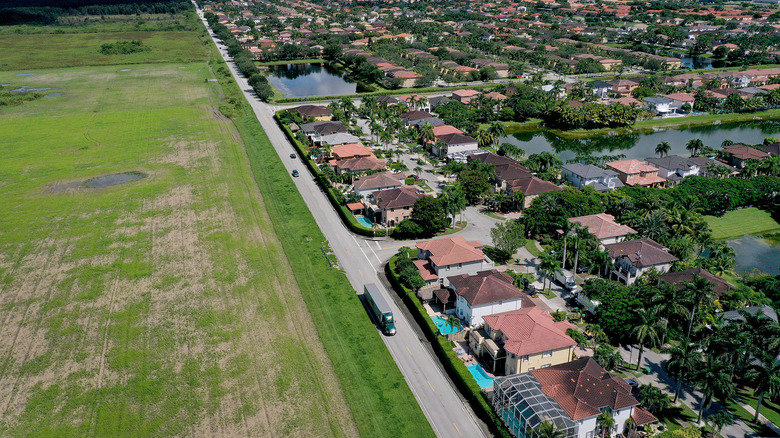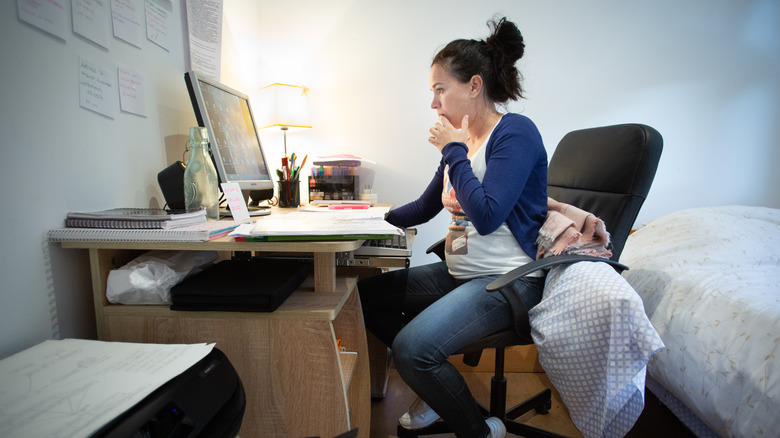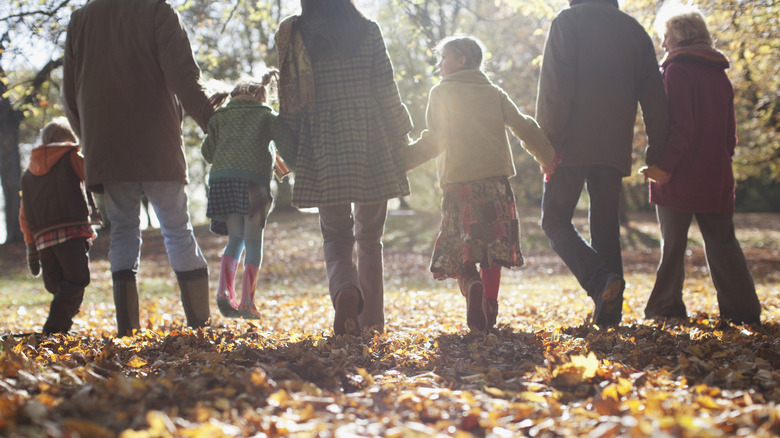The 'Third Place' Is A Way Of Creating Community - Here's How To Use It To Your Advantage
We may receive a commission on purchases made from links.
Think about your daily or weekly routine for a minute. What does it consist of? Work, errands, Netflix, household chores, and maybe squeezing in dinner with a friend? Perhaps there are a few hours spent on social media.
What if we were to tell you that somewhere in the 1980s, a sociologist named Ray Oldenburg thought that it would be beneficial for humans to have a "third place" they frequent in their day-to-day lives? In his book "The Great Good Place," Oldenburg defined this space as somewhere separate from a person's home or workplace. Now, while your mind might be scrambling to think of such a place in your own life, what the sociologist was referring to is actually informal community spaces that had very few financial limitations (if any) to get into. Making conversation — either with strangers or people you've gotten to know over time — was one of the central activities in this space. You could spend long hours engaging in interesting dialogue with all sorts of people. You won't be asked to leave after a few hours and you'd feel at home in this third place. It's a place you'd choose to go to. It's almost like a sanctuary that takes you away from the chores of your home and the responsibilities of your office. Perhaps now, the options in your head have decreased.
The idea might seem out there, and yes a lot has changed since Oldenburg gave a name to it.
Modern society isn't really conducive for 'third places'
TikToker Nathan Allebach talked concisely and informatively about the need for "walkable communities" in order to foster third places in modern society in one of his videos. A lot has changed over the years when it comes to how cities and housing are designed. There is a sense of separation between public spaces and where we actually live, making it more challenging for us to actually visit third places like cafes, libraries, clubs, churches, etc.
Ray Oldenburg himself, in an interview with 360 Magazine, shared, "Americans don't know how to build cities. A livable city should have the daily necessities within walking distance, and we've moved so far from that. We have to get in the car for everything."
In addition to challenges brought on by urban planning, Allebach also explained that "technology, polarization, [and] institutional distrust" are other possible reasons for why third places don't thrive in today's society. Given how much it's talked about in media, we all know why social media makes us sad. Even though we're able to connect with anyone, anywhere with just a click of a button, virtual relationships have a tendency to make us feel isolated. Even so, you might be wondering who has the time for a home away from home in this day and age? And what can you possibly derive as an advantage from seeking out a third place? Here are some thoughts that might change your mind.
A 'third place' can offer you a change of scenery and a chance for spontaneity
Staring at the wallpaper in your office (however pretty it is) and returning home to familiar surroundings can have its merits, but we all crave a change of scenery from time to time.
According to therapist Naomi Light, breaking away from the mundane can do a lot for our minds. She explained to Calm Moment that spontaneity promotes creativity, emotional intelligence, and intuition. Furthermore, the element of a good surprise can actually make us happy. "The emotion of surprise is useful therapeutically (so long as it is a good surprise) as it can switch our brains into the positive connector emotions of trust, love and joy," she added.
A third place of your choice — whether it's a local book club if you love to read or a fitness center where fellow sports enthusiasts can gather to discuss life and health — can be good for your soul. Perhaps this is why even businesses have borrowed from the concept, creating shared spaces like coffee shops within the work environment that promote conversation and creativity.
It could force you out of your comfort zone
Ray Oldenburg was so hungry for a third place that he transformed his garage into a bar. "I lucked onto a genuine mahogany cabinet and stocked it with liquor. The refrigerator is full of beer, there's a little wine fridge, and so on ... We have regular hours, Wednesday and Sunday. All sorts of people come over: the library staff at the university, a brother-in-law, a retired physician, and many others," he told 360 Magazine.
When was the last time you spent an afternoon communing with people of different walks of life? If you can recall a time, you'll also remember how enriched, enlightened, and happy you felt after the encounter. There's something about being open to new knowledge and experiences that makes your heart do a happy dance. Third places can offer all that and more.
Nathan Allebach shared with CBC that such associations are the "glue to social cohesion."
It might inspire you to set aside your devices
Tied to the idea of community-building, third places, by definition, rule out connecting with someone over the internet. As tempted as you might be to categorize social media as a meaningful third spot, according to Ray Oldenburg, it falls short. "The idea that electronic communication permits a virtual third place is misleading. 'Virtual' means that something is like something else in both essence and effect, and that's not true in this instance," the sociologist shared with 360 Magazine.
All you have to do is go on Twitter or any other social media platform to see how angry and hateful people can be with their comments and posts. Part of the problem is that we've forgotten what it's like to be human when interacting with someone. The advantage of third places is that they can help you remember. You can choose to leave your phone at home when you head out and instead focus on crafting deep questions that will help you get to know someone.
Nathan Allebach told CBC that we can move away from the sense of "cold detachment" that comes from connecting virtually to actually creating community.
How to find a 'third place' to enrich your life
It's important not to get stuck on the details when creating your third place. Ray Oldenburg may have painted a picture of what it should look like in his day but it might be useful to temper it with the reality of now — like where you live, what you easily have access to, and your financial considerations.
Even if your third place is centered around helping seniors in your community, what matters is that you start with an interest or hobby that appeals to you. If you're not much of a drinker, there's no point in choosing a bar and if you're trying to stay away from caffeine, picking a café might not be the best idea (although the TikToker Allebach said he met his wife at a coffee shop), per CBC. Making sure that the space is not too far away from where you live or work would also be a good impetus that keeps you consistent in your practice.
Psychotherapist Natalie Jones told PopSugar that you could even turn your virtual connections into something face-to-face in the real world. What matters is that you set yourself in a place of advantage to draw from the benefits of the principle.





